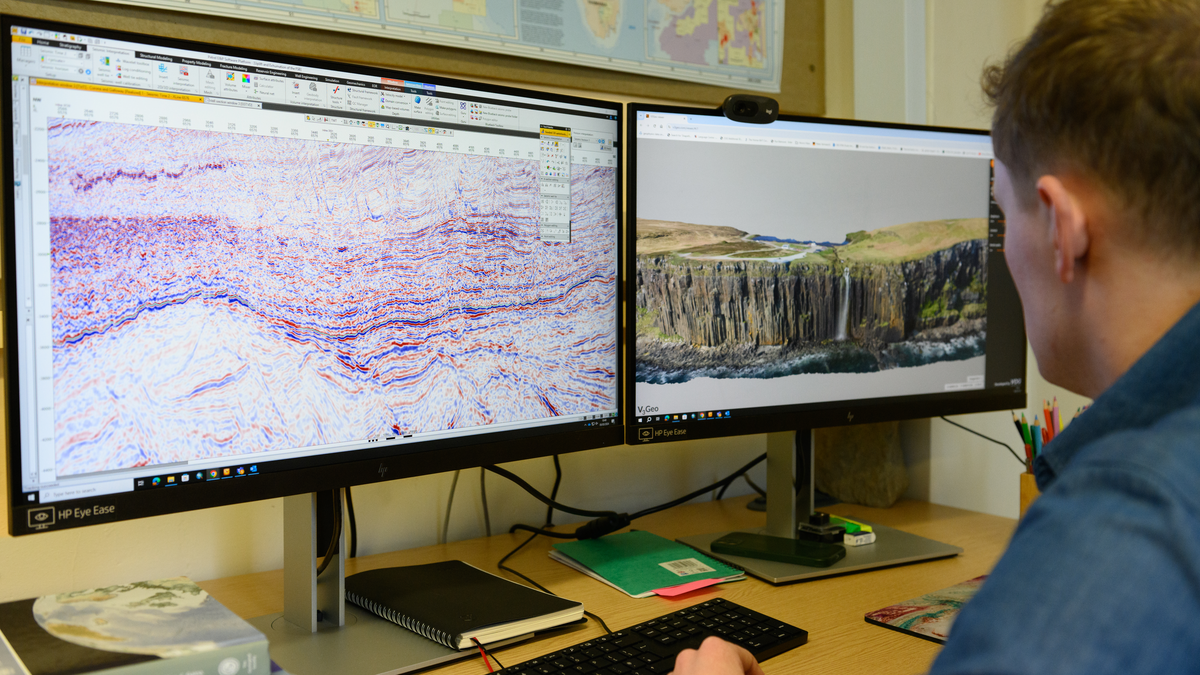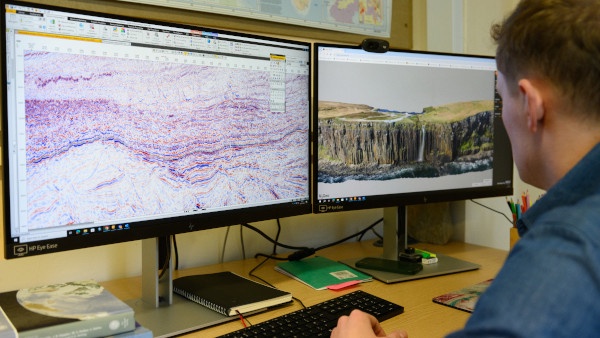Corey Towns United Kingdom

Running since 1973, the MSc Integrated Petroleum Geoscience programme is internationally regarded as one of the top vocational training pathways into the energy industry. Based in the heart of the UK energy sector, IPG provides world-renowned training in the practical and technical skills required by the global hydrocarbon exploration and production industry, with input and support from major oil and gas operators.
IPG is generously supported by our industry partners including Equinor, Shell and Neo Energy, through student projects, guest lectures, mentoring opportunities and scholarships (see Funding details below.

The MSc Integrated Petroleum Geoscience equips you with the knowledge and skills to understand the subsurface and hydrocarbons stored there.
IPG receives detailed input and support from the energy industry, ensuring it remains current and relevant, particularly as we move forward toward net-zero. The curriculum focuses on all aspects of upstream geoscience, including exploration, field appraisal and development, maximising recovery from mature fields, as well as considerations for repurposing depleted fields for carbon storage.
Hands-on field-based study is a crucial part of our geology teaching, and this programme is no exception, with UK and international field trips where you will apply and develop your subsurface analysis and core logging skills.
The close ties between the University of Aberdeen and the energy industry mean our students can benefit from industry training and projects, as well as professional mentorship and career networking opportunities from companies such as Equinor, Harbour Energy, Neo Energy, Baker Hughes, Hess and Shell.
Our approach and teaching methods also aim to create a close parallel to the way the energy industry works, further enhancing teamwork and communication skills, to allow you to transition from education to employment upon graduation.
The course content recognizes the increasingly diverse backgrounds of the students, as more first degree courses are modularised with significant non-geological components. The course content is designed as far as possible to fill in the gaps for such students, although we rely on the students to work at making up for their own weaknesses, under our guidance. Numeracy skills are important; we advise students to assess their own needs for additional training.
This course, which is prescribed for all taught postgraduate students, is studied entirely online, takes approximately 5-6 hours to complete and can be taken in one sitting, or spread across a number of weeks.
Topics include orientation overview, equality and diversity, health, safety and cyber security and how to make the most of your time at university in relation to careers and employability.
Successful completion of this course will be recorded on your Enhanced Transcript as ‘Achieved’.
30 Credit Points
By the end of this course, the student should:
15 Credit Points
By the end of this course, students will be aware of issues in relation to team work, particularly communication, diversity, and organisation. They will be able to communicate technical interpretation effectively by oral, written and electronic methods. They will utilise knowledge gained in the field and classroom to complete a number of industry-facing tasks through assessments based on real life scenarios utilising field-based data and concepts derived from lectures and field observations. These skills will be developed on two fieldtrips, one of which will focus on the exceptional geology exposed in Utah.
30 Credit Points
The course aims to develop practical geological skills applicable to the extraction and sequestration of fluids in the subsurface, embracing the subdisciplines of tectonics and structural geology together within clastic and carbonate sedimentology, stratigraphy, and diagenesis; The main basin-forming processes with be introduced to provide context for the sedimentary geology. The basics of structural geology for trap definition and characterisation are developed and applied, deducing structural styles on seismic images and examples of how deformation influences reservoir behavior and trapping mechanisms. The course will show how structural, sedimentological and stratigraphic knowledge is crucial in both exploration and development activities, and is fundamental in making predictive models. It will impart a practical knowledge of depositional environments which form hydrocarbon reservoirs and targets for CO2 sequestration, linking these together using the techniques of sequence stratigraphy as applied to siliciclastic and carbonate settings. The origin and effects of reservoir fluids and subsequent diagenesis will also be covered.
15 Credit Points
This course aims to deliver key skills and understanding of the role of the geologist in development planning, driving production throughout a field’s life. There is an emphasis on the interface with Reservoir and Well Engineering, Operations and Commercial disciplines. The course gives students an understanding of fluid flow in the subsurface and how it might be impacted by geological heterogeneity. The approaches employed in building qualitative and quantitative geological models of the subsurface, and the difficulties associated with doing this reliably will be covered.
15 Credit Points
This course aims to demonstrate the stages in a hydrocarbon exploration project from initial basin screening, through the identification of leads and prospects, to an economic assessment. The course includes components of structural geology, tectonics, organic geochemistry, and basin modelling. It is important to view these activities in an economic context; accordingly, the course aims to explain the role of the geologist in the business of exploration and appraisal of hydrocarbons. This aims to inform the student of important economic and logistical constraints which operate alongside geological details.
15 Credit Points
Lectures and practical exercises will provide you with the knowledge and skills to de-risk the subsurface for storage of energy (in the form of compressed air and hydrogen), and for the safe and long-term storage and sequestration of CO2. Seminars will introduce case-study examples of storage within porous rocks, evaporites and volcanics. The course concludes with a group project that is designed to emulate how a subsurface storage site would be evaluated by a technical team in industry.
Example projects from previous years:
60 Credit Points
In the final project you are expected to undertake and complete a study of a subsurface problem applicable to the energy industry. The project is an extended, independent, self-directed, piece of practical work integrating and reinforcing the material taught on the programme, and giving a detailed insight into the demands of, and ways of working in the energy industry. The project forms a major part of the MSc’s employability strategy.
We will endeavour to make all course options available. However, these may be subject to change - see our Student Terms and Conditions page.
| Fee category | Cost |
|---|---|
| EU / International students | £31,000 |
| Tuition Fees for 2025/26 Academic Year | |
| Self-funded international students commencing eligible postgraduate programmes in 2025/26 will receive a £8,000 tuition waiver - See full terms and conditions | |
| UK | £11,900 |
| Tuition Fees for 2025/26 Academic Year Graduates of the University of Aberdeen are eligible for the Alumni Postgraduate Scholarship, which reduces the tuition fee to £7,000, in line with the current tuition fee loan amount offered by the Student Awards Agency Scotland (SAAS). Please see the following for full terms and conditions: https://www.abdn.ac.uk/study/funding/653 | |
Aberdeen Global Scholarship: Eligible self-funded international Masters students will receive the Aberdeen Global Scholarship.
All eligible self-funded international Postgraduate Masters students starting in September 2025 will receive an £8,000 scholarship. Learn more about this Aberdeen Global Scholarship here.
To see our full range of scholarships, visit our Funding Database.
Practical work, projects and reports will be assessed continuously throughout the programme. Examinations are held in December and April on the preceding term’s curriculum. An oral examination will be held. Candidates will be expected to present a final report on a relevant and approved major topic.
The information below is provided as a guide only and does not guarantee entry to the University of Aberdeen.
Our minimum entry requirement for this programme is a Geology or Geophysics degree at 2:1 (upper second class) UK Honours level (or an Honours degree from a non-UK institution which is judged by the University to be of equivalent worth).
Please enter your country or territory to view relevant entry requirements.
To study for a Postgraduate Taught degree at the University of Aberdeen it is essential that you can speak, understand, read, and write English fluently. The minimum requirements for this degree are as follows:
IELTS Academic:
OVERALL - 6.5 with: Listening - 5.5; Reading - 6.0; Speaking - 5.5; Writing - 6.0
TOEFL iBT:
OVERALL - 90 with: Listening - 17; Reading - 21; Speaking - 20; Writing - 21
PTE Academic:
OVERALL - 62 with: Listening - 59; Reading - 59; Speaking - 59; Writing - 59
Cambridge English B2 First, C1 Advanced or C2 Proficiency:
OVERALL - 176 with: Listening - 162; Reading - 169; Speaking - 162; Writing - 169
Read more about specific English Language requirements here.
You will be required to supply the following documentation with your application as proof you meet the entry requirements of this degree programme. If you have not yet completed your current programme of study, then you can still apply and you can provide your Degree Certificate at a later date.
Eligible self-funded Postgraduate Taught (PGT) students will receive the Aberdeen Global Scholarship. Eligibility details and further information are available on our dedicated page.
Aberdeen Global ScholarshipOver the last decade, more than 90% of our MSc graduates have been employed in the oil and gas, energy and applied industries or gone straight on to funded PhD research. A large number of graduates from the programme now hold very senior roles in some of the world's major oil and gas companies.
It is clear Hydrocarbons will play an important role in ensuring our energy supply for decades to come and form a crucial role in Net Zero targets. Exploration and production roles will be required going forward and that this remains a vibrant industry to enter. By laying down the fundamentals in subsurface investigation, the course will also equip you with the knowledge to branch into other careers that involve examining the subsurface, including emerging geoenergies such as CCUS.
The dynamic nature of the programme provides all-round preparation for a wide-range of employment opportunities within a mobile, dynamic, wealth-creating industry. You will also benefit from graduating from a programme that truly is recognised as one of the strongest of its kind around the world.
Organisations that we work with across a number of areas include – Apache, Statoil, Baker Hughes, BP, Chevron, Conoco Phillips, Dana Petroleum,Halliburton, BP, Shell, Pemex and SaudiAramco, to name a few. These links,and more help us deliver world-class teaching and research.

BP has supported this degree over several years and has identified it as a key course from which to recruit graduates. Aberdeen uses local petroleum industry knowledge to produce well rounded geoscientists that are keen to start their careers.
You will be taught by a range of experts including professors, lecturers, teaching fellows and postgraduate tutors. However, these may be subject to change - see our Student Terms and Conditions page.

A teaching class room and a computing room with high spec. blades are dedicated for the MSc IPG students. A range of analytical equipment, state-of-the-art industry software packages are available for the courses and projects.